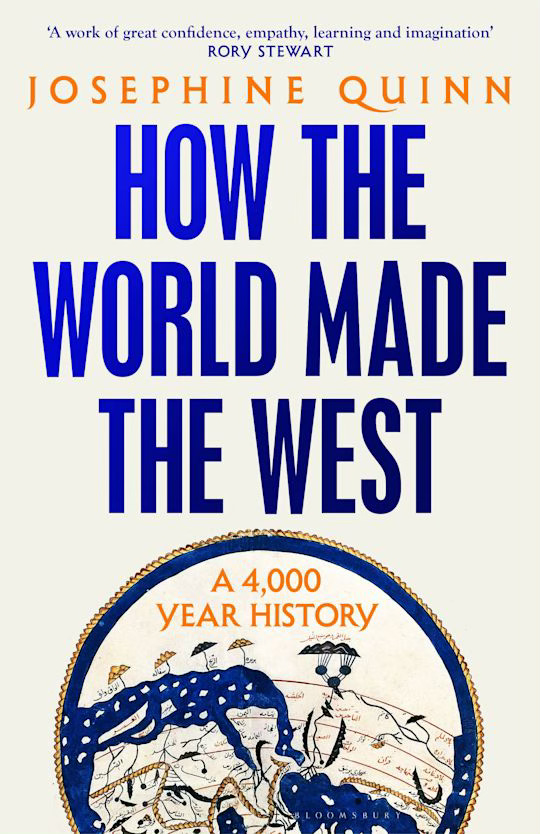Writing books is hard. Really hard.
So when I find books already published that help me write books, I’m grateful.
I’m not talking about “How to Write the Great American Novel”-type books.
I mean books that show me what I want to do (and not do) with my book just by having been written.

To me, these are much more helpful than the How-To’s.
The two books I’m enjoying right now are THE AWAKENED BRAIN (2021) by Lisa J. Miller and HOW THE WORLD MADE THE WEST (2024) by Josephine Quinn. Both books are by immensely-learned academics, the former in psychology, the latter in history. Both books found mainstream publishers and are aimed at mainstream audiences.
But they couldn’t be more different in tone and approach.
THE AWAKENED BRAIN argues that spirituality is the missing key to living a fulfilled life.

That thesis doesn’t seem especially novel. People have been saying you need to look to a higher power for strength and joy for as long as humans have had the awareness to imagine the existence of a higher power.
But, as Miller points out, in our increasingly secular, achievement-oriented society, the message of spirituality as life-giving has been lost. We are anxious and depressed and looking for answers in all the wrong places.
The real achievement of this book is that Miller demonstrates, scientifically through brain research and psychological data, the incontrovertible benefits of spirituality on human lives.
What’s more, Miller writes her book like a can’t-put-it-down memoir. She weaves her own personal story about her quest to start a family into the fabric of her argument, juxtaposing, say, her experience inside a Lakota sweat lodge with an explanation of how quantum physics proves the interconnectedness of all things.
The argument itself unfolds like a story as well: she chronicles the progress of her research, building experiment on hypothesis, year on year, fellowship on fellowship, astonishing conclusion on stunning data.
It’s a thrill, despite the fact that she’s taking you through the intricacies of brain anatomy, neuroscience, and the inner workings of the field of psychology.
My book is not going to be as glamorous as THE AWAKENED BRAIN, but I’d like it to be as engaging.
My book is going to be something like HOW THE WORLD MADE THE WEST, the subject of which is similar to mine, and the author of which is trained in my same field.
Josephine Quinn is a badass scholar with tons of academic credits under her belt. If anyone is qualified to write authoritatively on 4,000 years of history, it’s her.
But I have to admit that making 4,000 years of history accessible and even thrilling to a general audience is a tough, tough proposition.
Quinn’s voice is not tremendously user-friendly. She’s not writing scholarship, that’s clear (read FROM HITTITE TO HOMER for gorgeous scholarship—if you, like me, enjoy learning new definitions for words like “cola”). But she isn’t Lisa Miller, writing as if she’s sitting across from you in a café dishing about what’s going on in her life.
Quinn’s job is the same as mine: to let everyone know that creativity is not the property of one anointed genius.
But her tone has its challenges.
Miller starts out her book with sunshine. Quinn? She begins with a complaint.
Every November I sit in my college rooms to read this year’s batch of undergraduate applications, and I read the same thing in almost the exact same words: “I want to study the ancient world because Greece and Rome are the roots of Western Civilization.”
You’d think she’d be happy that anyone wants to study the ancient world in this day and age. But she wants to let all her prospective students know that they are mistaken.
They are practicing “civilizational thinking.”
“Civilizational thinking,” holds that different peoples in different places all have particular characters that are unique in themselves and stand-alone. “Western civilization” is different from “Chinese civilization” which is different from “African civilization” and so on.
In reality, she writes,
Human society is not like a forest of trees, with subcultures branching out from single trunks. It is more like a bed of flowers, in need of regular pollination to reseed and grow anew.
I love this metaphor. I wish she had included more like this one in her narrative.
So is THE AWAKENED BRAIN a better book than HOW THE WORLD MADE THE WEST? Aha, you say. Look at the Goodreads numbers. Dedicated readers spend thousands of hours considering the worth of books like these two.
And what do the numbers say? THE AWAKENED BRAIN has an average of 4.16 stars, HOW THE WORLD MADE THE WEST 4.02.
Truly, they are very different books. I just got excited about how their stories are told.
So what about my book, which has gone from being called THE INVENTION OF GREEK MYTHOLOGY to THIEVES OF THE GODS? That title change was very much for the purpose of engagement. “Invention” is lovely and all, but it’s an abstract concept. “Thieves” is much more concrete and—let’s be honest—fun.
I’ll post my introduction again soon to gauge opinion. I’m not going to have a story as thrilling as Lisa Miller’s, and I don’t have the breadth of knowledge of Josephine Quinn, but I’ve got a story to tell and I’m going to tell it.



